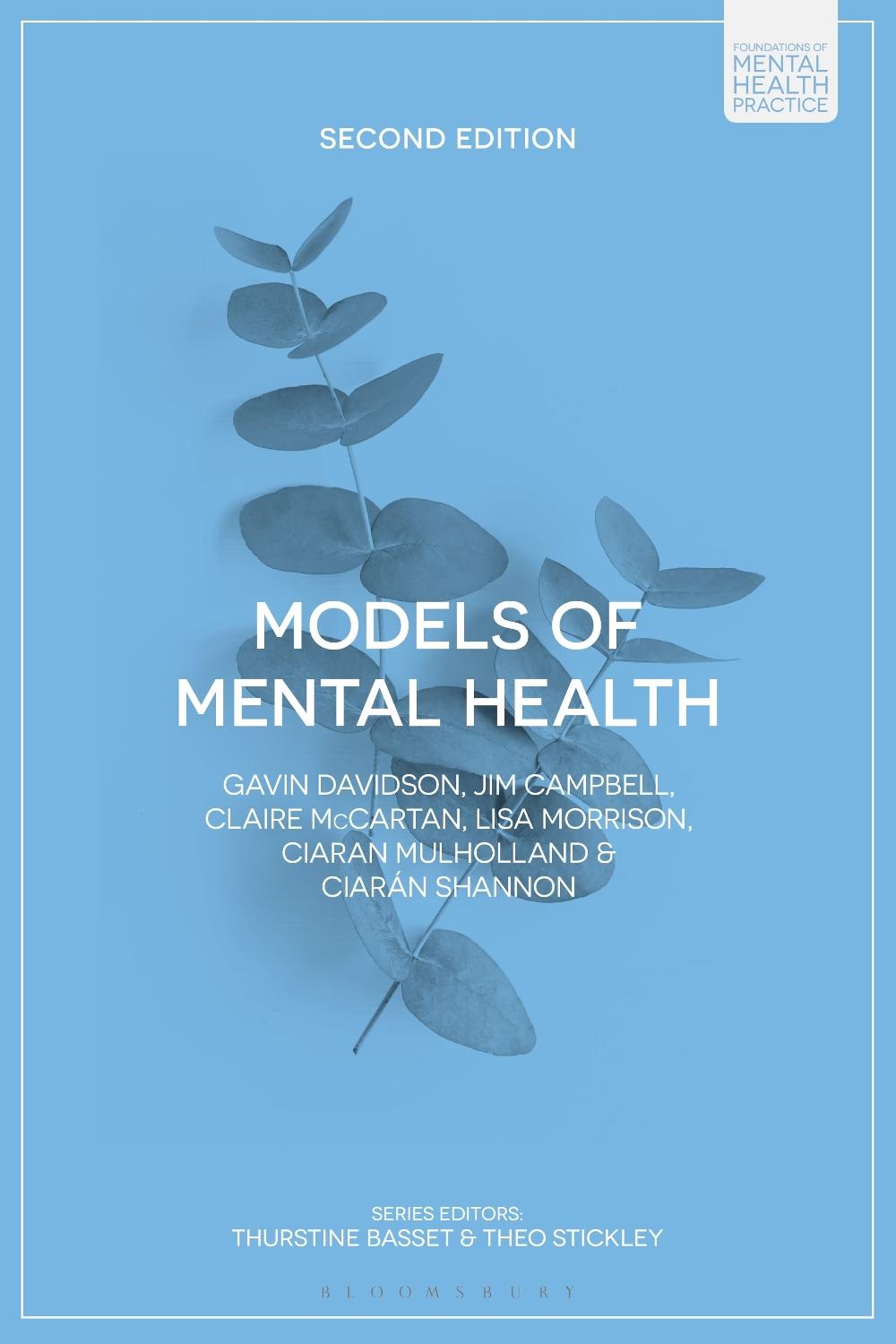
Models of Mental Health
$56.09
- Paperback
208 pages
- Release Date
15 April 2026
Summary
Models of Mental Health: A Critical Overview
This textbook presents a critical overview of the main theoretical perspectives relevant to mental health practice and argues that no one theory provides a comprehensive framework for practice.
By examining traditional models of mental health, as well as new, it challenges some of the accepted views in the field and illustrates the importance of recognising the contribution, strengths and limitations of the range …
Book Details
| ISBN-13: | 9781350477636 |
|---|---|
| ISBN-10: | 135047763X |
| Series: | Foundations of Mental Health Practice |
| Author: | Gavin Davidson, Jim Campbell, Lisa Morrison, Ciaran Mulholland, Ciarán Shannon, Dr Claire McCartan |
| Publisher: | Bloomsbury Publishing PLC |
| Imprint: | Bloomsbury Academic |
| Format: | Paperback |
| Number of Pages: | 208 |
| Edition: | 2nd |
| Release Date: | 15 April 2026 |
| Weight: | 454g |
| Dimensions: | 234mm x 156mm |
What They're Saying
Critics Review
I like the clear layout of this book and its balance. The mix of authors backgrounds and specialisms has undoubtedly contributed to this. I found it helpful to me as a lecturer in the preparation of my course materials. As a topic, models are sometimes glossed over or you find textbooks cover only the bio/social/psych models and avoid the subtleties and complexities inherent in this topic. This book doesn’t avoid the abstract or the complexities of the field and encourages students to embrace the grey areas and avoid reductionist approaches to understanding. I particularly appreciated the systemic approach and the use of exercises/questions and case studies. For this edition: Increase cross cultural aspects. Consider why models are important…their implications for the area of policy development and resource allocation, law and politics. Update throughout to include contemporary research where appropriate and address why models of mental health are increasing in number. * Lori Stevenson, Lecturer in Psychology, Glasgow Caledonian University, UK *Clear, straightforward objectives, sound argument, well sourced and referenced Comprehensive overview of diverse perspectives. Effective interweaving of ideas and practices across history. Multi-disciplinary authorship enables detailed overviews of the various different perspective. Strong articulation of current priorities. I don’t think the book has specific weaknesses. It strikes just about the right balance between being accessible to beginners while retaining academic strengths. It does, however, risk becoming dated. All of the topics covered are fast moving so to retain currency the book would benefit from a ’spring clean’. * Mark Hardy, Senior Lecturer in Social Work, University of York, UK *It’s an excellent book. Good use of language and case studies. Poses questions at times to get the reader to think critically. For this edition, use more case studies within chapter link to support guidance i.e. things students might wish to consider. Transgender awareness/issues within the medical model could prove interesting discussion. * Mark Edwards, Lecturer in Mental Health Nursing, University of Central Lancashire, UK *Concise. Attractive. Not intimidating in size and length. Bio-medical, psychological and social perspectives all (key lenses) covered. Supporting exercises and case studies are appreciated by students in a text. A whole section on spirituality is uncommon, bold and exciting – it is missing from many texts but is increasingly an aspect of integration of whole self (service user and practitioner) in practice that students ask about. Some really clear and helpful figures and tables. For a new edition: include much more expanded and nuanced chapters on what is currently chapter 4 ‘Service user-led perspectives’. I would problematize a biomedical emphasis. I wouldn’t use the word Psychiatry, if meaning mental health. I would move away from ‘perspectives’ framings – as though it is just a viewpoint or optional lens; e.g. I would highlight Service user leadership and expertise. I would have sections on Diversity, Intersectionality, Youth, Aged, LGBTIQA+ and Trauma-informed models. I would not only elevate Service user knowledges, including Mad Studies, but would also elevate Family carer expertise and Relational models, the silencing of these voices while relying on (women’s) unpaid work (so Feminist theory). * Melissa Petrakis, Associate Professor of Social Work Monash University, AUS *
About The Author
Gavin Davidson
Gavin Davidson is Senior Lecturer in Social Work at Queen’s University Belfast, UK.
Jim Campbell is Professor of Social Work at University College Dublin, Ireland.
Claire McCartan is Lecturer in Education and Social Work at Queen’s University Belfast and the Senior Researcher with the Regional Trauma Network in Northern Ireland.
Lisa Morrison is an independent Mental Health Trainer and Consultant.
Ciaran Mulholland is Senior Lecturer in Medical Education and Psychiatry at Queen’s University Belfast, UK, and a Consultant Psychiatrist in General Adult Psychiatry.
Ciarán Shannon is a Consultant Clinical Psychologist in the Northern Health and Social Care Trust, Northern Ireland.
Returns
This item is eligible for free returns within 30 days of delivery. See our returns policy for further details.




